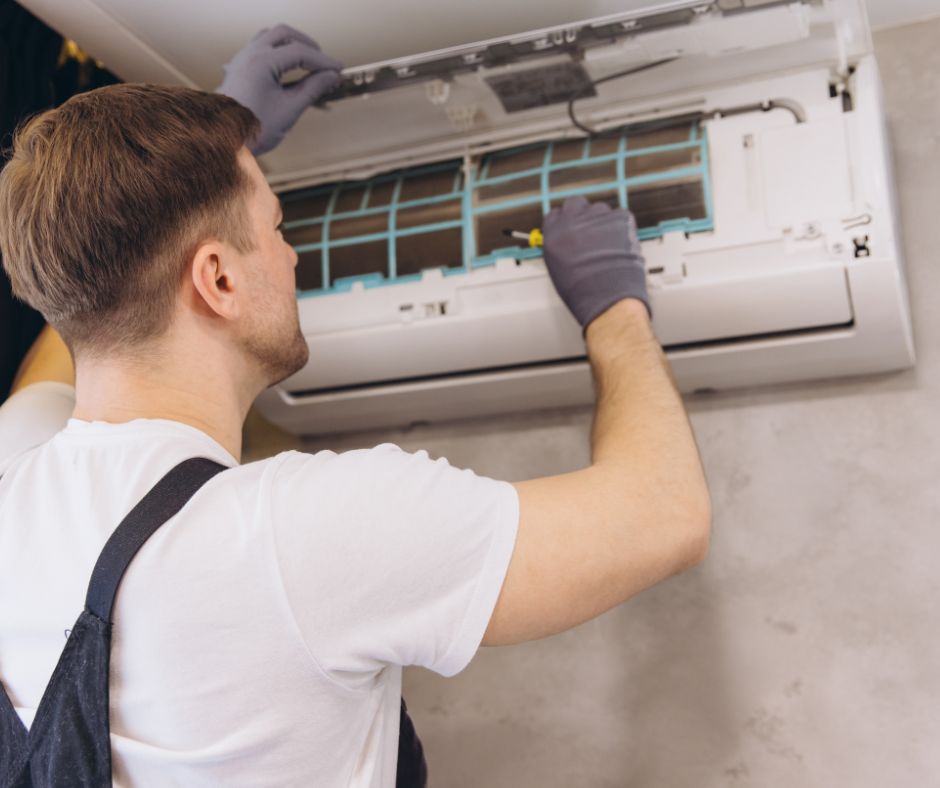HVAC professionals deal with potentially dangerous situations every day, from electrical hazards to heavy equipment and chemical exposure, so knowing standard HVAC safety tips is essential for anyone looking to get into the field.
According to OSHA, workers’ injuries are down from 10.9 incidents per 100 workers in 1972 to 2.4 per 100 in 2023, so keeping HVAC safety front and center is more important than ever.
If you’re looking to build your knowledge before entering the field or simply want a refresher, these HVAC safety tips are a great place to start. Stratford Career Institute offers introductory training courses where we can help you explore HVAC as a career and go over safety rules, too.
1. Electrical Safety and Precautions
It might seem obvious, but one of the most common causes of injury in HVAC work is forgetting to disconnect power sources. Before inspecting, repairing, or replacing any part of an HVAC system, check that the power is completely shut off at the breaker and testing wires.
Even systems that appear off can still hold a charge. That’s why one of the most essential HVAC safety training principles is double-checking with a voltage tester before handling wires or components. Skipping this step can lead to electrical shock or serious burns.
2. Wear the Right Personal Protective Equipment (PPE)
Personal protective equipment (PPE) is one of the simplest but most effective ways to stay safe on the job. This includes gloves, safety goggles, steel-toed boots, and respiratory protection when working around dust, chemicals, or gas fumes.
Proper PPE isn’t just about protecting against big accidents. It can also shield you from common everyday hazards like insulation particles, sharp metal edges, or chemical refrigerants. Following these HVAC safety guidelines can go a long way in preventing injury.
3. Be Mindful of Chemical Exposure
When you work in HVAC, you’re often working in confined spaces, increasing your risk of chemical exposure. Refrigerants, cleaning agents, and other fluids used in installation and repair can cause burns, respiratory irritation, or other health issues.
Good ventilation is key. If you’re working in a tight space, open windows or use a fan to circulate air. If a system needs to be evacuated or charged with refrigerant, follow procedures carefully and wear the proper equipment. Chemical safety is a critical part of HVAC health and safety.
4. Use Ladders and Lifts Safely
HVAC technicians often work in attics, rooftops, and crawlspaces, places that require climbing, lifting, and balancing. Falls are a common cause of injury in the trades, so ladder and lift safety should never be overlooked.
Check that your ladder is stable and positioned correctly, and never stretch or lean beyond what’s safe. When working on rooftops, use fall protection as needed. These may seem like simple reminders, but they’re some of the most important HVAC technician tips you can follow.
5. Stay Aware of Your Surroundings
Being alert and aware is a must on any job site. Tripping hazards, unstable structures, tight corners, and hot surfaces pose risks. This is especially important when working in residential or commercial settings where other people may be nearby.
Before you start work, take a moment to assess your surroundings. Check for blocked exits, exposed wiring, or anything that looks off. Developing this habit can help you spot minor issues before they become major ones.
Situational awareness is emphasized during HVAC safety training, and it is a skill that grows stronger with practice.
6. Keep Learning and Follow Local Codes
HVAC systems and safety regulations change over time. Keeping your knowledge updated is just as important as following routine precautions. Whether learning about new refrigerant rules, fire safety codes, or installation methods, ongoing education is a key part of working safely.
Following local building codes and industry standards is another part of HVAC health and safety. These rules are there for a reason and help protect technicians and customers.
Learn More About HVAC Safety with an Introductory Course
Following proper HVAC safety procedures isn’t just about avoiding injury; it’s about being a professional. Whether you’re just beginning your career or already working in the field, these HVAC safety tips can help keep you, your coworkers, and your clients safe.
If you’re new to the field, beginner courses, like our new HVAC course, can introduce you to important topics in HVAC systems and safety. While we do not offer certifications or meet licensing requirements, our courses can be a helpful first step in your career journey as an HVAC technician.


